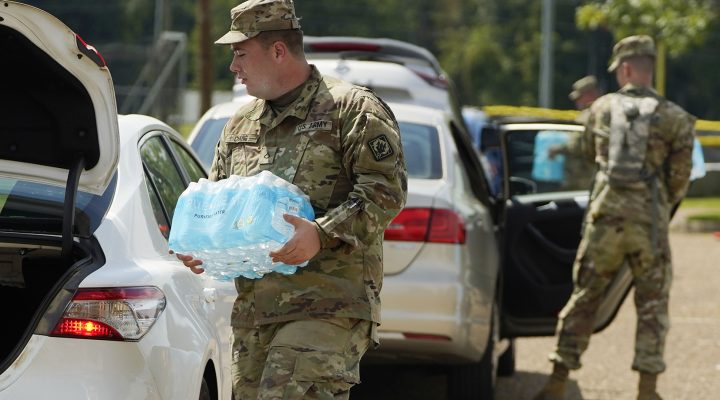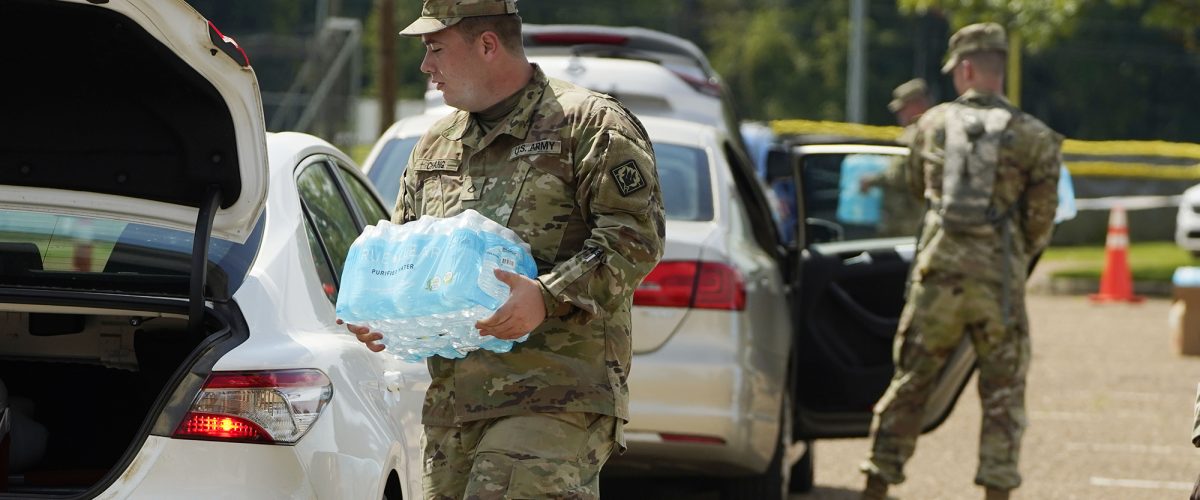When the capital city of Mississippi had no running water for an entire week, government agencies came to the rescue with water distribution outlets, but some of the major faith-based disaster relief organizations were nowhere to be found. Why?
The answer appears to be that the water crisis in Jackson, Miss., was not a “natural disaster,” which is what groups like Samaritan’s Purse, the Southern Baptist Convention’s SEND Relief program and Texas Baptist Men are accustomed to addressing.
Even though water pressure returned to the city Monday, Sept. 5, after a week of no running water, the city of 150,000 people remains on a boil-water advisory because the city water is not safe to drink. The boil-water advisory has been in place for a month already.
Samaritan’s Purse is one of the nation’s largest disaster relief organizations. According to Forbes, it has annual revenue of $899 million and an additional $924 million in assets. The faith-based organization is well-known for its humanitarian relief work at home and abroad.
But it was minor weekend flooding in Jackson that was being monitored by Samaritan’s Purse, not the lack of running water.
“Samaritan’s Purse has been in close communication with several partners in the Jackson, Miss., area, and we have key volunteers monitoring the situation on the ground,” said Samaritans Purse spokesperson Kaitlyn Lahm. “Local reports estimate that roughly a dozen homes were flooded. While this is devastating for the families who are affected, it is contained enough for the local community to support these families without the need for disaster relief organizations to mobilize volunteers from across the country.”
But the greatest need in Jackson is drinking water, not flood relief.
“Any time a disaster happens we assess the situation, and our response is determined by the needs and our own ability to respond to these needs.”
“Thankfully, the National Guard and local organizations have responded, and there is an abundance of bottled water available,” Lahm said. “We have key volunteers in the area who are continuing to monitor the situation on the ground should needs change and Samaritan’s Purse be able meet these needs. Any time a disaster happens we assess the situation, and our response is determined by the needs and our own ability to respond to these needs. The demographic of an area is never a part of that decision. We respond in Jesus’ name to people who are hurting without regard to race, religion, politics or beliefs.”
The same appeared to be true for the largest disaster relief organizations affiliated with predominantly white Baptist groups.
By its cooperative policy, SBC disaster relief, known as SEND Relief, only dispatches volunteers when asked to do so by state Baptist conventions. According to reports in the Baptist Record, the state Baptist newspaper, the state convention has been in contact with SEND Relief, even though disaster relief units were not requested to be dispatch.
According to the paper, “a Zoom teleconference with Metro Association leadership, Mississippi Baptist Convention Board staff, MBDR leadership, and pastors from Metro Association was held on the afternoon of August 30. An operational plan was shaped to support ministry to the most vulnerable residents of the city. Leveraging existing relationships with community ministries, the participating Metro Association congregations will be focusing their attention on the elderly, infirm, homebound and their own members who live in the city who may not have access to the distribution sites across the city due to age, transportation or physical limitations.”
Further, “bottled water will be made available for delivery by church and community ministry volunteers,” the paper said. “By supplementing the efforts of local and state governments, it is hoped that many of those who would ‘fall through the cracks’ might be served and their needs provided for in these times.”
Also not present in Jackson: Texas Baptist Men, one of the best-known disaster relief organizations in the nation.
On Monday, Sept. 5, Communications Director John Hall said Texas Baptist Men has “had conversations with representatives (in Jackson), but we are not at the point of doing anything.”
Had a tornado blown through the town or had floodwaters swept away houses, all three groups likely would have been on the scene within hours. But this kind of water crisis is not in their normal playbook.
Predominantly Black churches, however, were on the scene and active in water distribution.
C.J. Rhodes, pastor of Mount Helm Baptist Church, Jackson’s oldest historically Black congregation, opined in a tweet: “The reality is the present water crisis in Jackson is decades in the making and is comprised of different issues regarding water quality, reliability, and metering. Instead of asking ‘Who’s to blame?’ we should ask, ‘Who’s responsible?’”
Rhodes also pointed to the crisis as evidence of an entrenched and systemic pattern of racism in the city in another tweet: “We can neither deny the history & present reality of economic racism in Jackson, nor ways city leadership over the years has failed to act decisively. Working together across racial and political lines is necessary, and much more like wartime diplomacy than a group assignment.”
Related articles:
If you think the Jackson water crisis is just about Mississippi, you’re all dried up | Opinion by Wendell Griffen
In Jackson, Miss., the lack of water flows into conversation about God, politics and public trust | Opinion by Jason Coker
Do Franklin Graham’s accusations against progressive Christianity hold up against truth? | Analysis by Patrick Wilson


